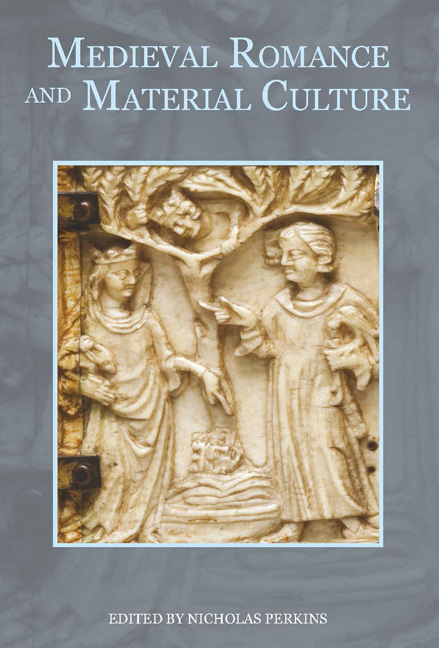41 results
Abbreviations
-
- Book:
- Medieval Romance and Material Culture
- Published by:
- Boydell & Brewer
- Published online:
- 05 May 2015
- Print publication:
- 16 April 2015, pp xiii-xiv
-
- Chapter
- Export citation
Contents
-
- Book:
- Medieval Romance and Material Culture
- Published by:
- Boydell & Brewer
- Published online:
- 05 May 2015
- Print publication:
- 16 April 2015, pp v-vi
-
- Chapter
- Export citation
Index
-
- Book:
- Medieval Romance and Material Culture
- Published by:
- Boydell & Brewer
- Published online:
- 05 May 2015
- Print publication:
- 16 April 2015, pp 275-285
-
- Chapter
- Export citation
Frontmatter
-
- Book:
- Medieval Romance and Material Culture
- Published by:
- Boydell & Brewer
- Published online:
- 05 May 2015
- Print publication:
- 16 April 2015, pp i-iv
-
- Chapter
- Export citation
List of Contributors
-
- Book:
- Medieval Romance and Material Culture
- Published by:
- Boydell & Brewer
- Published online:
- 05 May 2015
- Print publication:
- 16 April 2015, pp xi-xi
-
- Chapter
- Export citation
2 - Courtly Culture and Emotional Intelligence in the Romance of Horn
-
-
- Book:
- Medieval Romance and Material Culture
- Published by:
- Boydell & Brewer
- Published online:
- 05 May 2015
- Print publication:
- 16 April 2015, pp 23-40
-
- Chapter
- Export citation
List of Illustrations
-
- Book:
- Medieval Romance and Material Culture
- Published by:
- Boydell & Brewer
- Published online:
- 05 May 2015
- Print publication:
- 16 April 2015, pp vii-x
-
- Chapter
- Export citation

Medieval Romance and Material Culture
-
- Published by:
- Boydell & Brewer
- Published online:
- 05 May 2015
- Print publication:
- 16 April 2015
Acknowledgements
-
- Book:
- Medieval Romance and Material Culture
- Published by:
- Boydell & Brewer
- Published online:
- 05 May 2015
- Print publication:
- 16 April 2015, pp xii-xii
-
- Chapter
- Export citation
Afterword: Robert Thornton Country
-
-
- Book:
- Robert Thornton and his Books
- Published by:
- Boydell & Brewer
- Published online:
- 28 February 2023
- Print publication:
- 17 April 2014, pp 257-272
-
- Chapter
- Export citation
13 - ‘Pur les francs homes amender’: Clerical Authors and the Thirteenth-Century Context of Historical Romance
-
-
- Book:
- Medieval Romance, Medieval Contexts
- Published by:
- Boydell & Brewer
- Published online:
- 12 September 2012
- Print publication:
- 17 March 2011, pp 175-188
-
- Chapter
- Export citation
Christianity and the Matters of Romance
-
- Book:
- Christianity and Romance in Medieval England
- Published by:
- Boydell & Brewer
- Published online:
- 02 March 2023
- Print publication:
- 15 April 2010, pp 1-2
-
- Chapter
- Export citation
Issues and Debates
-
- Book:
- Christianity and Romance in Medieval England
- Published by:
- Boydell & Brewer
- Published online:
- 02 March 2023
- Print publication:
- 15 April 2010, pp 67-68
-
- Chapter
- Export citation
8 - Athelston or the Middle English Nativity of St Edmund
-
-
- Book:
- Christianity and Romance in Medieval England
- Published by:
- Boydell & Brewer
- Published online:
- 02 March 2023
- Print publication:
- 15 April 2010, pp 139-149
-
- Chapter
- Export citation
Abbreviations
-
- Book:
- Christianity and Romance in Medieval England
- Published by:
- Boydell & Brewer
- Published online:
- 02 March 2023
- Print publication:
- 15 April 2010, pp xii-xii
-
- Chapter
- Export citation
Teaching Romance
-
- Book:
- Christianity and Romance in Medieval England
- Published by:
- Boydell & Brewer
- Published online:
- 02 March 2023
- Print publication:
- 15 April 2010, pp 159-160
-
- Chapter
- Export citation
Reading Romances
-
- Book:
- Christianity and Romance in Medieval England
- Published by:
- Boydell & Brewer
- Published online:
- 02 March 2023
- Print publication:
- 15 April 2010, pp 119-120
-
- Chapter
- Export citation
Dedication
-
- Book:
- Christianity and Romance in Medieval England
- Published by:
- Boydell & Brewer
- Published online:
- 02 March 2023
- Print publication:
- 15 April 2010, pp vii-viii
-
- Chapter
- Export citation
Contents
-
- Book:
- Christianity and Romance in Medieval England
- Published by:
- Boydell & Brewer
- Published online:
- 02 March 2023
- Print publication:
- 15 April 2010, pp v-vi
-
- Chapter
- Export citation
Frontmatter
-
- Book:
- Christianity and Romance in Medieval England
- Published by:
- Boydell & Brewer
- Published online:
- 02 March 2023
- Print publication:
- 15 April 2010, pp i-iv
-
- Chapter
- Export citation

